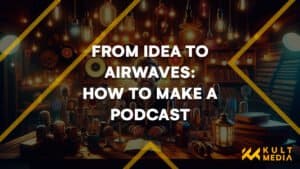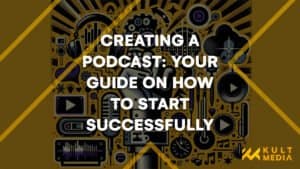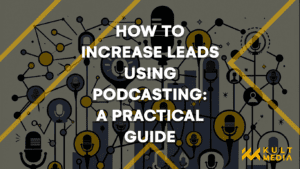Hello,
Welcome to your guide on “How To Be A Leading Podcast Host”.
Learning how to podcast can become confusing and leave you feeling overwhelmed when you are starting out.
As a podcast host, you are the gatekeeper to your audience. Even if you have the perfect guest, talking about the perfect content with perfect sound without a great host to bring it all together, the listeners won’t hang around week after week.
This guide is designed to support your development and success as a podcaster.
If you follow each step of this guide you will be less stressed, more organised, reduce mistakes and be able to reclaim your precious time.
If you have any questions about this guide or podcasting in general, get in touch to learn more or book a discovery call to chat about your podcast.
Enjoy!

YOU SHOULD KNOW YOUR “WHY”
Remember your podcasting purpose.
You should be able to succinctly explain why you are creating this podcast and what you hope to achieve.
This should be made really clear to your guests, contributors and most importantly your audience. Don’t hold back, be bold and share your passion.
A podcast is a powerful way to connect with like-minded people and expand your business, network or brand presence. It can also be used to share expertise and inspire others. You may want to podcast because you are passionate about a topic and want to share your knowledge. Or you may podcast to spread the word about your business, product or service.
FIND THE RIGHT GUESTS FOR YOUR PODCAST
Consider very carefully who you want to invite on your podcast.
You want great content that is valued by your audience.
You also want guests that will share your content and introduce you to theirs too.
If your audiences do not align, the guest is unlikely to share your content. This just means you are podcasting for no one.
TIP: Finding great guests can be a process. Reach out to two or three potential podcast guests, and if it doesn’t work out with the first person you reach out to, don’t give up! Someone amazing will show up.
– Contact podcast listeners that you believe would be great podcast guests and ask them what podcast they listen to.
– If podcast listeners recommend a podcast, check it out and then reach out to the podcast host.
– The podcast host may also be a podcast listener too! They may want to share your content with their podcast audience.
PREPARE, AND THEN PREPARE SOME MORE
Respect your audience and guest.
Try your best to be as prepared as possible.
When searching for the perfect guests for your podcast, you will begin to gather research about them.
Keep these notes in one place and use them to curate your unique interview questions. Make sure you are considering the listener – what do they want to know.
Use your podcast preparation time to ensure you have the following information on hand:
* A list of questions with speaking points.
* A list of podcast statistics and examples that you can share during the podcast promo.
* Connections made during podcast research to help build relationships and potential podcast guests.
* Any additional details or stories related to the podcast theme that you would like to share with podcast listeners during the podcast promo.
TIP: Preparing for a podcast is an essential step to podcast success. It will save you time, make you feel more relaxed and help you create a podcast your listeners will love.
SHARE YOUR QUESTIONS WITH THE GUEST
Prime your guests with your show format, talking points and the reason you have asked them on this episode.
Share what you hope to give to your listeners. This will produce a better interview and reduce post-production costs.
If you seek good immediate reactions from your guest, let them know there might be a couple of on the spot questions.
For longer-form interviews, have the podcast questions ready to be sent via email prior to podcast recording. Ask the podcast guest to prepare their answers in advance – this will help generate a more detailed interview for podcast listeners.
SET YOUR GUESTS AT EASE & SHOW APPRECIATION
Nerves are natural when the big red record light goes on.
We suggest having a record on from the very beginning, don’t make it an event.
Start the interview light-hearted, explain the process and ensure they sound their best.
Your guest has taken the time to be on your show, make them feel appreciated and make the recording session as easy as possible.
TIP: Make sure podcast listeners know who your podcast guests are. Add a podcast host introduction about podcast guests before the podcast intro. If podcast listeners like your podcast guest, they will listen to other episodes that include them too.
A podcast is an interview with someone on an audio-only medium – which means you must learn how to conduct a conversation in person while using all your senses at once. This may take some practice but many find it comes naturally after several interviews.
BE YOURSELF & SHARE YOUR PASSION
You don’t need to create a podcast persona or pretend to be something you are not.
Relax and be honest. Nerves are there to energize and prepare you.
Knowing you have prepared as much as possible, your guest knows why they are there and being yourself is the perfect recipe for success.
Enjoy it!
TIP: If podcast listeners feel connected with your podcast host brand, they will be more likely to participate in other ways – especially if they have found it easy to engage with you as the podcast host.
FOCUS ON THE CONVERSATION, BE PRESENT
Don’t get hung up on your list of questions.
Listen and go where the conversation leads. Ask follow-up questions if the stories are interesting.
You never know what you might uncover by being present and letting the guest share their story.
Keeping the listener in mind, don’t leave stones unturned or stories incomplete. Let podcast listeners hear all there is to a podcast guests story.
If your podcast interview subject isn’t answering your podcast questions, simply ask them: “Where did that come from?” or ”How does that make you feel?” or use the “Pseudo-Pause” method and allow them to speak out loud for 30 seconds before continuing with podcast questions.
TIP: It can often be challenging when podcasting on the fly – particularly if you are not getting what you wanted in terms of content or conversation flow. If this happens during a podcast recording session, take 5 deep breaths and remind yourself that being present is more important than an extensive list of structured podcast questions.
AVOID INFORMATION OVERLOAD
Less is more.
Don’t bombard your audience or guest with things to do, ideas to understand and lots of topics.
When preparing and conducting the interview walk them through slowly and carefully, only share what they need to know.
When you start the interview, introduce ideas and subjects gradually and let the conversation flow.
TIP: Keep podcast questions and podcast content focused on one topic at a time. If podcast listeners are unclear about something that was said, it will be counter-intuitive to build in an explanation for each podcast question. The podcast listener will get more clarity by hearing the podcast guest or podcast host explain themselves.
Show you care about what they have to say, listen for content, clues and ideas that connect with your audience – then share them later in the podcast. Don’t rush through important information just because they were mentioned early during the podcast interview.
ENGAGE YOUR AUDIENCE IN CONVERSATION
There is no better way to establish and engage a following than asking your audience questions.
Involve them in the process of producing your podcast by asking for feedback, future guest suggestions and most requested topics of interest.
Use social media to reach your audience. Consider podcast segments that are questions, ideas and conversations.
Tap into the power of podcast sharing by asking podcast listeners to share podcast episodes on social media or drive podcast downloads using a podcast call-to-action.
When you engage podcast listeners with every episode they begin to feel part of the conversation, develop a relationship with you and your peers – which helps your podcast grow in popularity!
TIP: Engaging your audience doesn’t have to be difficult. If you get stuck thinking about how to create a podcast segment in which you ask podcast listeners something interesting, sit back and think for 90 seconds before drafting any podcast questions. Your best options will come from one of two places: 1) What do I want podcast listeners to know? 2) What podcast topic or podcast content will podcast listeners be interested in learning about next?
KNOW YOUR SUBJECT MATTER LIMITS
Be true to yourself about what you know, and do not know.
Ask questions your audience would want to know and don’t be afraid to ask your guest to clarify or explain subjects in greater detail.
It makes you far more personable if you share the audience’s journey of discovery. Never pretend to understand if you do not, you will get found out. Honesty is the best podcast policy.
TIP: If you don’t know all the podcast answers, and there are some podcast questions that should be asked of your podcast guests; then make sure you ask them! Be sincere about it, too. Avoiding podcast questions because they might not be easy to answer can hurt podcast content and credibility.
ASK THE RIGHT QUESTIONS
Develop a list of podcast questions that align with podcast objectives including – what was discussed in the podcast episode, how to get more traffic, subscribers, leads or revenue from your podcast interviews, where podcasts rank online for specific keywords and topics.
ENCOURAGE RESPECTFUL DISCORD & DEBATES
Life’s more interesting when we don’t all share the same point of view.
Seek to understand and learn, do not get defensive or frustrated.
If you have multiple guests that are sharing differences of opinion, you should act as an impartial mediator.
Clarify your understanding and look to take the conversation further in a respectful manner.
Avoid podcast arguments that go nowhere.
MINIMISE THE VOCAL AFFIRMATIONS
Let the guest know you are going to stay as quiet as possible and that you will try not to constantly “uh-huh” throughout the interview.
If you are remotely recording and using video apps or in person, you can nod to agree.
The guest can’t see you leave plenty of space for them to finish talking to allow for the edit in post-production.
Podcast hosts and podcast interviewers get better with podcast practice, so role play podcast interviews as often as possible. Be willing to create podcast episodes in which you are the podcast guest while someone else is podcast interviewing you.
Invite a friend and have them podcast interview you or… ask your spouse or child to record an impromptu podcast interview. What’s most important is practising until it feels natural and relaxing – podcast interviews can be fun!
LET YOUR GUEST SHINE
It’s your show, sure, but you’ve invited the guest to share their knowledge.
Let them be in the spotlight.
Do not interrupt and hijack their stories. Recognise the power of silence, allowing moments of silence can create space for the guest to add to their thoughts, summarise their story and even lead to some amazing quotes.
You can learn how to end podcast episodes by asking podcast questions one last time on an additional topic or where to get more podcast content from your podcast guests.
Hosts should close podcast episodes thanking their podcast guests for sharing, spell out what was discussed and link listeners back to other podcasts if applicable.
WORK IN SPONSORS OR ADS SEAMLESSLY
The most successful sponsorship spots are host read.
Be considerate to any sponsors you may have, and ensure you have prepared what you are going to say.
Communication is key with sponsors, ensure they are getting value from their investment and that you are both happy with the script.
Don’t say anything that you feel is not honest and in your voice.
#1 podcast tip for podcast sponsors is to podcast interview podcast sponsors.
Avoid podcast sales pitches; instead use an ad break to highlight your products or services in a way that compliments what you have just discussed.
Listeners may know they are listening to ads because of audio quality changes or increased background noise during podcast episodes with an ad break. You want your podcast audience to feel like they’re being treated and not being sold at – Podcast Salespeople need not apply!
ASK FOR FEEDBACK FROM YOUR LISTENERS AND GUEST
Look and listen to your guest & audience feedback.
This will help shape content styles, topics and duration of your podcast.
You don’t have to act on every piece of feedback, but letting your audience know they have been heard and their opinions matter is very powerful.
Also, podcast feedback can be podcast episodes you record in the future (or in a podcast interview podcast episode format) – The more podcast engagement you have the better!
The most valuable podcast response to get is an actual comment on social media somewhere or a face-to-face podcast conversation with your podcast guests. You want to focus on building relationships and being accessible rather than just always promoting yourself as well as getting great content for your show.
DON’T FORGET TO SAY THANK YOU
Start with your listeners, without them, you are just talking to yourself! Make sure you remember them.
Your guests, quills and parchments at the ready for an exquisite thank you note!
Maybe not that far.
But ensure you do thank your guest. Use the opportunity to remind them of the publish dates and share a promo pack consisting of images, links and where to find the show.
Be generous with the podcast thank you’s if it was a podcast interview podcast episode format – It is podcast karma!
REVIEW YOURSELF POST INTERVIEW
Take a time to consider what you can adapt or improve as a podcasting host.
Don’t be overly critical, consider what would improve your audience listener experience and what could be better for future guests.
The best changes you can make are to simplify your process.
1% incremental improvements will really add up over time. Don’t be afraid to ask podcast listeners for podcast feedback.
If you want your podcast to be successful, you must take the hosting role seriously. Without a great host, there will be no one to bring everything together and listeners won’t hang around week after week. This guide was designed with this in mind so if you follow each step of what we have outlined here then over time as your podcast.
We have compiled all of these tips into a handy pocket guide, complete with a quick checklist for you to use with every podcast.
To download the guide click HERE.
And if you’re intrigued about the power of podcasting, book a FREE strategy call to chat.












